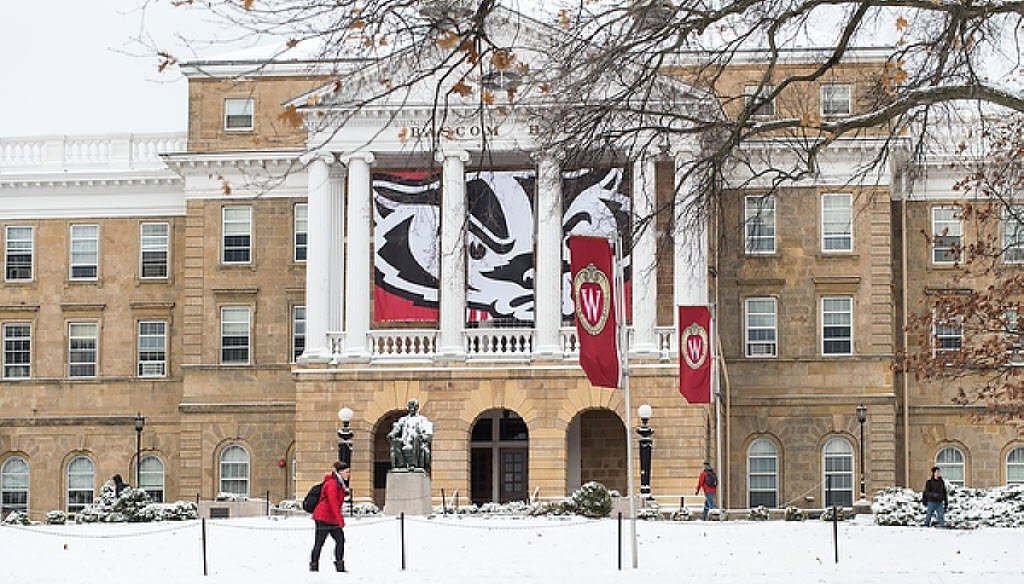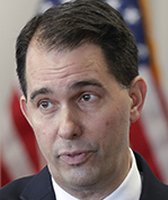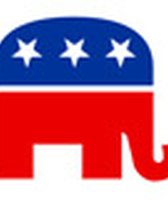Stand up for the facts!
Our only agenda is to publish the truth so you can be an informed participant in democracy.
We need your help.
I would like to contribute

A banner with a graphic of mascot Bucky Badger's face hung between the columns of Bascom Hall at the University of Wisconsin-Madison on Nov. 25, 2014. (UW-Madison photo)
Grothman mostly right on who would benefit from student loan debt forgiveness
If Your Time is short
-
People with higher incomes tend to have more student loan debt, most often because they attended graduate school
-
But wealthy people aren’t the only ones to attend college, meaning that lower-income people would still benefit from forgiveness – potentially to a proportionately large degree.
President Joe Biden and his administration are once again revisiting the idea of student loan forgiveness, a controversial idea that could allow for some – or even all – student debt to be erased.
While some have pushed for debt forgiveness, seeing it as a potential injection of money into the economy, others – including U.S. Rep. Glenn Grothman, R-Wisconsin — have questioned the idea.
"Nearly 60% of all student loan debt is held by the rich and upper-middle class," he said in a May 21, 2022, newsletter. "So, by forgiving student loan debt, we would be handing the wealthy a financial windfall while low income Americans suffer further from inflation and rising costs."
For this fact-check, we’re going to look at the portion of the claim about who holds student loan debt, and whether or not forgiveness would help low-income people.
Wealthier majors tend to make more money after college, spend more on degrees
When asked for backup for the claim, Grothman’s office shared a couple of sources of information with us.
The first was an analysis from EducationData.org, a group of researchers who collect data and statistics about U.S. education. According to the May 8, 2022, report, Americans with income over $74,000 hold about 60% of the total public student loan debt, while households that earn $35,000 or less a year hold about 20% of the total public student loan debt.
According to the group, those earning $74,000 or more are considered middle to upper-middle class, while those earning $35,000 or less are considered lower-middle class or poor.
So, Grothman is mischaracterizing the data a bit, inasmuch as he’s labeling that group the "rich and upper-middle class."
Looking further at who has student debt, many of those who pursue graduate degrees owe more money, according to a Jan. 21, 2022 article from Forbes. That’s perfectly logical, in that there is more education to pay for.
For example, a young doctor may owe about $200,000 in medical student debt, but medicine is also one of the best-paid professions in the U.S. That means the student’s lifetime income prospects would allow them to pay off their loans.
Featured Fact-check
Grothman’s office also shared a Brookings article from February 2022, which outlined how those who stand to see the most money forgiven would be higher income, better educated and white.
"Beneficiaries of across-the-board student loan forgiveness would be higher income, better educated, and more likely to be white than beneficiaries of just about all other programs designed to reduce hardship and promote opportunity and targeted to those who need help," the article said. "Prioritizing spending on targeted programs would therefore be a more effective way to achieve progressive goals."
The article then highlights the child tax-credit program as an example of a program that might directly benefit more people living in poverty than student loan debt forgiveness.
In any case, Grothman is largely right on the numbers.
But he misfires a bit in suggesting that loan forgiveness would not matter much to low-income people. For college graduates in lesser-paying jobs, it might make a huge difference in terms of their finances.
Adam Looney, executive director of the Marriner S. Eccles Institute at the University of Utah and a nonresident fellow in economic studies for the Brookings Institute, noted that wealthy people aren’t the only ones to attend college.
"Some low-income people also have student debt, so they would also be helped by forgiveness. It’s just that they are less likely to have debt at all (because they are less likely to have been able to go to college in the first place) and have less debt if they go to college (often because they haven’t finished a degree or went to a low-cost community college,)" he said in an email. "So I think poor people do not benefit as much as higher-income households from across-the-board debt forgiveness policies."
Grothman claimed that most student loan debt is held by wealthier people, meaning that student loan debt forgiveness would be a "windfall" for the rich and not make much difference for low-income people.
It is true that people with higher incomes hold more debt — often because they attended graduate school and, if the loan is bigger, it would be more of a "windfall" to them.
But people with lower incomes also attend college, and on an individual level may benefit proportionately more from student loan debt forgiveness. For those, it could be a game changer.
We rate this claim Half True.
Our Sources
Glenn Grothman, newsletter, May 21, 2022
EducationData.org, "Student loan debt by income level," May 8, 2022
Forbes, "Study: Most student debt belongs to high-wealth households," Jan. 12, 2022
Brookings Institute, "Putting student loan forgiveness in perspective: How costly is it and who benefits?" Feb. 12, 2022
Email conversation with Adam Looney, the executive director of the Marriner S. Eccles Institute at the University of Utah and a nonresident fellow in economic studies for the Brookings Institute, June 1, 2022
Browse the Truth-O-Meter
More by Laura Schulte
Grothman mostly right on who would benefit from student loan debt forgiveness
Support independent fact-checking.
Become a member!
In a world of wild talk and fake news, help us stand up for the facts.





















































